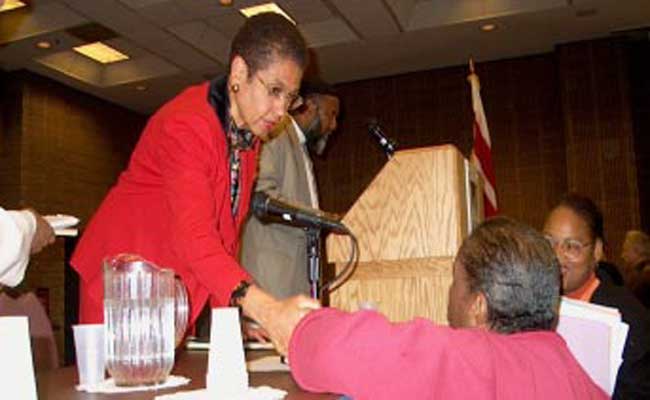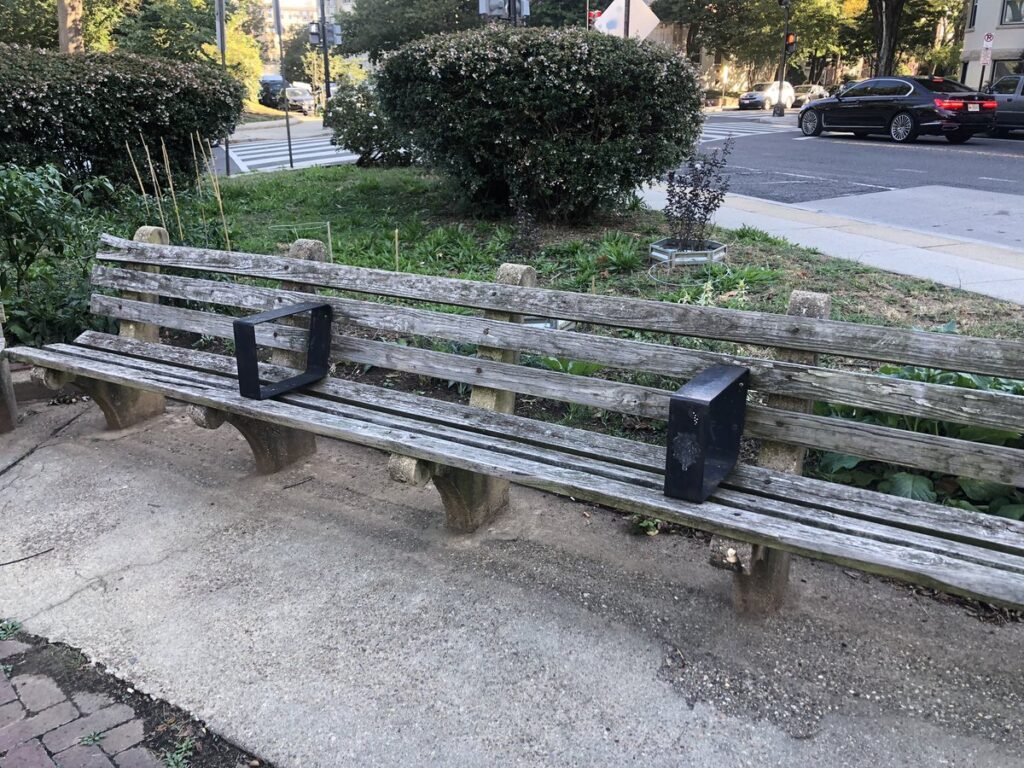Congresswoman Eleanor Holmes Norton (D-DC) is a fourth-generation Washingtonian. She is serving her seventh term in the U.S. House of Representatives. Nationally recognized as a civil rights leader and tenured professor at the Georgetown University Law Center, she was educated in District of Columbia public schools. Norton successfully led the effort to free legendary Mississippi civil rights activist Fannie Lou Hamer from jail, was an attorney for the American Civil Liberties Union in New York, chair of the New York Commission on Human Rights, and chair of the Equal Employment Opportunity Commission under President Jimmy Carter. Congresswoman Norton has received numerous honors and awards for her public service. Street Sense spoke with Congresswoman Norton about homelessness in America at her office. Muata Jordan Langley conducted the interview.
Street Sense: Thank you for granting this interview, Representative Norton.
Eleanor Holmes Norton: Let me first congratulate you on the work of establishing a homeless newspaper in this city– and I am especially pleased that homeless people will be vendors. A problem for homeless people is income in order to pay for affordable housing. I think you educate us at a time when we are greatly in need of it.
Homelessness has not disappeared in the U.S., the world’s richest and most powerful nation. In fact, it appears to have increased. Why have poverty and homelessness persisted in a nation with such enormous wealth?
Norton: The appearance of homelessness in the western world when that was not a phenomenon before is very troubling. There are a large number of people on the street who can’t take care of themselves. That’s one whole large group. But frankly, the major cause in our country is the lack of government support for affordable housing.
You can’t expect the private sector to develop affordable housing. They are in the profitmaking business.
The Bush budget had a huge reduction in government support for affordable housing. The government is directly responsible for ending homelessness. Very frankly, it is not on the agenda much up here. Of all the great issues: healthcare, also off the agenda. Only prescription drugs are on the agenda.
Studies show that at least 2.3 million, and perhaps up to 3.5 million, people experience homelessness at some point during an average year. How does one explain such startling numbers?
Norton: Some of those numbers come simply from joblessness. Most of it comes from the fact that if for some reason you no longer have access to affordable housing, you will have a very hard time getting into any kind of affordable housing. Thirty-nine percent of these people were families – that means people with children. This is outrageous. Single occupancy has disappeared.
Homelessness goes up at a time like this when joblessness goes up. People who can’t pay their rent are put out in the street. Extended families are not available in the way they were– in the same location to take care of people. Therefore, we allow people to fall through the cracks or fall through the holes. We seem not to care.
The U.S. Conference of Mayors (December 2002) reported that cities are facing “high housing costs and a weakening economy,” which have contributed to increased shelter and food assistance demands and inadequate homeless assistance services. With the shortage of jobs and escalating housing costs, is this a perfect recipe for “accelerated homelessness?”
Norton: Of course it is, and that’s what we’re getting. We’re getting quite accelerated homelessness. This is what the Bush economy is giving us – joblessness. Loss of 3 million jobs; imagine, we’re losing jobs. We don’t know when we’ve ever seen that. The economy is losing jobs at a breakneck speed.
Piled on top of that are the other problems of society and of affordable housing. So we really see homelessness increasing at a galloping pace. Yet without the pressure, I must tell you, the Congress of the United States won’t do much about it.
The problem is: When is the last time I’ve seen a bill come to the floor to deal with affordable housing? They, of course, do deal with their requisite Section 8 and we do fund public housing.
In the Bush budget, when it first came out, it had a huge reduction in funds for public housing. We all gathered here in the Congress to scream out against that, and most of that money got put back in. That shows you where housing is in the priorities of this administration, and, for that matter, of this Congress.
Speaking of cities, “quality of life” ordinances passed and enforced by local governments and private business districts are re-emerging – violating homeless persons’ rights and removing or preventing them from entering public spaces, even criminalizing their actions. Are we headed backwards in public policy for homelessness?
Norton: We may well be and we’ve got to do – I’ll give you an example in a National Park Service park. I got a call to my home from a constituent [who lived in a neighborhood] where children play in the park. And they were complaining that they’d called Park Service to talk about how homeless people defecated in the park and had essentially taken over the park. Well, see what you’ve got to do in that case; you can’t say, well, I’m sorry, this is a public space so anybody can go in here. You’ve got to recognize a park is for children– and yet if homeless people have no place to go, what are they supposed to do? I believe we’ve got to send into that kind of space personnel to help homeless people deal with their homelessness.
I do not say that homeless people should be allowed to set up housing in a park where children play and where families gather. But I think we have an actual obligation to send the medical personnel, the social service personnel into that park to help homeless people find a place where they can in fact go. And I think you can’t just say get the homeless out of this public space. Nor can you require that the public space be turned into a homeless shelter. And yet we are not dealing with the fact that we have a clash of important sectors in the society.
Instead you have, increasingly, regulations and laws that don’t deal with the problem at all but simply move it around.
There are visibly many homeless in the nation’s capital. What effect does this have, if any on tourism?
Norton: From the point of view of being the nation’s capital, it ought to be the last place where homeless people are. As for tourism, homeless people can only have a negative effect on tourism because they obviously beg anyone they can find. They look unkempt, and therefore it doesn’t help tourism. People are going to come to the District anyway because you can’t see the monuments or the Capitol any other way. But we have an obligation — a very special obligation — to in fact eliminate homelessness.
In the mid-1990s, there was a vision for the District of Columbia as a showcase for homeless assistance services. Can DC, the nation’s capital, be the future model for homeless services and programs?
Norton: I think it could for two special reasons. One has to do with the size of the city. It is not like dealing with homelessness in New York or Chicago, where you have a very huge population. Two, it is the nation’s capital, so there ought to be interest beyond ourselves. There ought to be interest by the federal government. Twenty million people come here a year– many of them are the constituents of my colleagues, who have an interest or should have an interest right along with me.
The Bush Administration has sought increased defense spending and a budget of $87 billion for Iraq while pushing back domestic programs for vulnerable people. What does the Bush report card look like for homelessness?
Norton: He hasn’t shown up for class for homelessness. He doesn’t even pretend on homelessness. I hold this administration absolutely responsible – directly responsible– for the very large increase of homeless people.
Are there solutions we can draw from the past in order to eliminate homelessness as we know it?
Norton: There are lots of solutions out there– they just lack funding. We got this big shelter on D Street. We got that shelter on D Street because there was a huge need. There was no place for all of these people to go.
We learned over the last twenty years that as important as shelters are, the most important thing you can do is provide a transition to a home. Many homeless people in shelters and in transition facilities need services, not just a place to lay down their head to rest. There are just countless success stories about people who went through that kind of transition. Otherwise, we are not even dealing with the problem of homelessness when we put somebody in a shelter and we think we’ve done enough.
In my own way in the Congress, I have tried to deal with housing. I recognized that Congress was not going to subsidize affordable housing. I was able to get a tax credit and $5,000 homebuyer credit absolutely up and down the income scale. You can imagine what it means to low-income mothers. But it also helped middle-income people to buy houses, and we need middle-income people in the city in order to help us deal with homeless people – with the taxes it takes to deal with poorer people in our cities. So, the $5,000 homebuyer credit has been great and is a very popular program here– and completely funded. It is federal income tax. Not only I, but also Democrats, who tend to care most about this issue, have had almost no success with this president.
We were able to get Hope VI. We’re a little more concerned about whether those housing units have been replaced unit-for-unit, however, which is the notion of Hope VI. Not making ghettos of people who needed affordable housing, particularly poor people, but integrating them with the larger community seems just to make sense. As you put mixed-income online, you’ve got to make sure that somewhere you are replacing the housing that poor people were in.
As Congressional Representative and advocate for the District, are there solutions you would offer to end homelessness in America?
Norton: There are things we can do, but we don’t want to do them. We don’t put the priority on homelessness. We see the homeless. We’re very sorry about it but other priorities go – that is the way in which this society works.
One of the most important things that people who are advocating on behalf of the homeless could do would be to organize them. Homeless people have to make a big show of organizing the homeless so that people in the Congress and people in local and state legislatures see that – “Watch out, they’re organizing these folks now, they are going to see that they get to the ballot box. The next time that X, Y or Z comes up I ought to look more closely at it.”
Rich people’s votes aren’t worth any more than mine– or the vote of the homeless man on the corner. When they go to count they don’t count the rich from the poor; they don’t say the rich one counts for twice as much as the poor one. Registering homeless people to vote. Doing what other people do – having a march on the Capitol. Having a march in your local hometown of homeless people and their allies. You get labor people, you get working people, and you get many people.
We have got to be with them. In very real sense, many of them are less able to simply do it. We must help them to become a visible constituency to improve services in this country.








